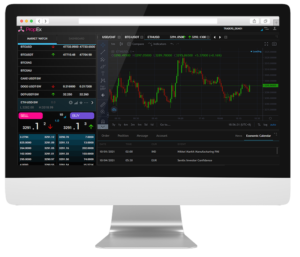Stock Trading
with CFD’s.
What is Stock Trading with CFDs?
Stock trading with Contracts for Difference (CFDs) is a form of derivative trading that allows traders to speculate on the price movements of underlying stocks without owning the actual shares. CFDs are popular instruments used in financial markets, including stocks, indices, commodities, and currencies.
When trading stocks with CFDs, here’s how it typically works:
1. Selection of Stocks: Traders choose the stocks they want to trade. CFD providers usually offer a wide range of stocks from various markets and exchanges.
2. Long or Short Positions: Traders can take either a long (buy) or short (sell) position on a stock. If they anticipate the stock’s price will rise, they go long, and if they believe the price will fall, they go short.
3. Contract Specifications: CFDs are contracts between the trader and the CFD provider. These contracts reflect the underlying stock’s price movement. The CFD provider sets the terms of the contract, including the contract size, margin requirements, and fees.
4. Leverage: CFDs allow traders to use leverage, meaning they can trade with a fraction of the total trade value. Leverage amplifies both potential profits and losses. However, it’s important to note that trading with leverage carries higher risk, and losses can exceed the initial investment.
5. Price Speculation: Traders aim to profit from the difference in the stock’s price between the time they open and close their position. If the stock price moves in their favor, they earn a profit; if it moves against them, they incur a loss.
6. Trade Execution: CFD trades are executed through the platform provided by the CFD provider. Traders can monitor the price movements in real-time, place orders, set stop-loss and take-profit levels, and manage their positions accordingly.
7. Costs and Fees: CFD trading involves various costs and fees, such as spreads (the difference between the buying and selling price), overnight financing charges, and commissions (depending on the broker). Traders should consider these costs when calculating potential profits or losses.
It’s important to note that CFD trading carries risks, and it requires knowledge, skill, and understanding of the market. Traders should consider factors such as market volatility, risk management, and their own financial situation before engaging in CFD trading. It’s advisable to educate oneself, practice with demo accounts, and seek professional advice if needed.
Tradeable Stocks Pairs.
When you trade our funded accounts you will have full access to over 600 global stocks.
Find your next market opportunity among the US most popular stocks like: Apple, Accenture, Adobe, Amazon, Bank of America, Berkshire Hathaway, Salesforce, Cisco, Chevron, Disney, Facebook, Alphabet-A (Google), HomeDepot, Intel, Johnson & Johnson, JPMorgan, Coca-Cola, Mastercard, McDonalds, Microsoft, Netflix, NIKE, NVIDIA, Novartis US, Oracle, Pepsi, Pfizer, Procter & Gamble, PayPal, QUALCOMM, AT&T, TMobile, Tesla, Visa, Verizon, Walmart, Exxon Mobil, etc.
With Eightcap you can take advantage of Shares CFD trading among top 100 London Stock Exchange listed companies: Astrazeneca, British American Tobacco, Bhp Group, Bp, Glaxosmithkline, Hsbc Hldgs, Royal Dutch Shell, Tesco, Unilever, Royal Mail, etc.
With Eightcap you can trade the top 200 Australian listed companies: BHP Group, Rio Tinto, Commonwealth Bank, Westpac Banking Corp, National Australian Bank, ANZ Banking Group, Woolworths, Macquarie Group, Wesfarmers, Telstra, Transurban, Fortescue, Woodside Petroleum, Goodman and many more.
Trading Platforms.

MetaTrader 4
MetaTrader 5
TradingView
Frequently Asked Questions.
Pros of trading Stocks CFDs
- Individual stocks can experience large price moves as companies fall in and out of favor.
- CFDs allow traders to profit from rising and falling share prices and to use leverage to increase exposure.
- Stock CFDs can be used to trade pairs. A par trade comprises a long position in one stock and a short position in another stock.
Cons of trading Stocks CFDs
- Stock prices can move quickly or gap when unexpected news hits the market.
- As with any leveraged instrument, large losses can result from poor risk management.
- When trading Stock CFDs, traders should keep up to date with company news.
| US stock | 14:35 – 20:55 (GMT) / 23:35 – 05:55(AEST) |
| London Stock Exchange | 11:05-19:25 (GMT+3) |
| German Stock Exchange (XETRA) | 10:05-18:25 (GMT+3) |
| Australian stock name | 10am – 4pm Sydney time |
Trader Support.
We know how important trader support is to you.
We encourage you to contact us in the many different communication channels.
We can help you.
Live Chat
Click on the Speech Bubble at the bottom right corner of any page.
Trading Forum
Join our Trader Assessment Forum over at AlphaTradrz.com
Tickets
Tickets are best for technical issues.
Always a good method. Good old email.
Zoom
Get face to face.
Discord
Yes we are on Discord. We do recommend however to use the Trading Forum.
